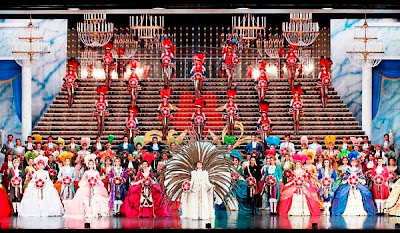When people talk about traveling, the topic of culture shock invariably comes up. Japanese people loved to ask me what surprised me the most about Japan, people back home wanted to know all about the weirdest food/fashion/vending machines/anime and my fellow foreigners loved bonding over our shared experiences of bewilderment and frustration. My post about life as a gaijin was partially about culture shock.
 |
| Mm, nothing sounds better as a light snack than dried, whole fish. |
But there is something even more bewildering and disconcerting that you very rarely hear about: reverse culture shock. It happens to people who spend a long period of time in another culture, experiencing all those jarring moments of regular culture shock and slowly becoming accustomed to them. Eventually, you become so used to your new culture that your native culture starts feeling foreign to you.
For me, it always starts at Narita as I'm waiting to board the plane home with all the other American ex-pats and tourists. The first thing I notice is that the people around me look gigantic, their clothes seem scruffy, all jeans and t-shirts, and they talk really loudly.
 |
| Who are these strange people and why are they so noisy?? |
Then I'm back in the U.S. and everything feels weird. I'm jet-lagged and a little delirious, which doesn't help with all the reverse culture shock I'm experiencing. My coping mechanism kicks in and I make a beeline for the first coffee shop I see (usually a Starbucks.) But I've forgotten the etiquette of how to order coffee in English. I fumble around with smelly American money (it really does stink compared to yen) before remembering that I can use my debit card again and getting inappropriately excited about that. The lady behind the counter is already looking at me strangely when I make the whole encounter even more awkward by accidentally bowing to her as I take my receipt.
Things improve a little bit after I've slept off the jet-lag, but there are still lots of little things that confuse or frustrate me. Where are all the conbini? We've just driven like ten blocks and I haven't seen a single convenience store. People keep eyeing my clothes oddly, making me feel ashamed that I'm not wearing the national American uniform of jeans + t-shirt. Meal portions at restaurants are so large I can make the left-overs into two additional meals. Complete strangers think it's appropriate to make friendly conversation with you.
 |
| Then again, perhaps I never had a good grasp of American fashion to begin with... |
Everyone expects to feel culture shock when they visit a foreign country. Sometimes people even enjoy it; it highlights the foreign-ness of the new place and makes things seem even more adventurous and exciting. It can also be frightening and rage-inducing, but that's mostly to be expected, too. It is, after all, a foreign country. Of course it's going to be foreign.
 |
| Yes, of course the statue needs a warm winter coat to protect it from the cold. You're always so logical like that, Japan. |
But experiencing those same feelings in your home country is a whole new level of disconcerting. Before going home you think to yourself: "Ah, it will be great to be back. I can finally get some of the food I've missed, see my family... everything will be normal again." And then you get there and everything is normal, but you aren't.
You've changed. Of course you're not Japanese, but now you're not totally American either. You've fallen into the middle space, the place where two cultures collide, and at first it is extremely discomfiting. But after awhile you learn to adjust again. Then you see the benefits to the middle space: it gives you a clearer perspective of both cultures. It lets you choose what you identify with the most from each of them. It lets you have the best of both worlds.
 |
| At least one thing will never change: as an American, I'll always look a little silly in a yukata. |







Hello!
ReplyDeleteYour information has been introduced in
http://news.searchina.ne.jp/disp.cgi?y=2013&d=0523&f=national_0523_005.shtml.
(in Japansese)
Thank you!
こんにちは!このブログを日本語へ訳してくれてありがとうございます。この記事を読んで日本人は日本に暮らしている外国人の生活をもうちょっと分かるようになったら、私が嬉しいです。
ReplyDeleteThank you for translating this blog post! I hope that by reading it Japanese people will be able to understand a little more about what it's like for foreigners living in Japan.
こんにちは。
ReplyDelete日本へ来てくれてありがとう。
浴衣とても似合ってます。かわいい!
Hello.
Thank you for visiting to Japan.
That Yukata looks great on you.
so cute! kawaii!
ありがとうございます! :) 白人私が浴衣を着たらちょっと可笑しくみえるかな。。と悩んでいたのにww
ReplyDeleteMauraさん
Delete浴衣、とても素敵です。
落ち着いた柄が大変似合っています。
それから、文章が素晴らしいですね。
面白く読みました。
日本を楽しんでくれてありがとう。
ブログを読んでくれて本当にありがとうございます!とても嬉しいです。^^
DeleteThis comment has been removed by the author.
ReplyDeleteこんにちは!サーチナの記事を楽しく読ませて頂きました。
ReplyDelete日本を楽しんでくれてありがとう!
浴衣似合っていて素敵ですね!
Skyさん こんにちは!
ReplyDelete記事を読んでくれてありがとうございます。日本人がとても暖かいので、いつか絶対にまた日本に行きたいと思います。^^
はじめまして。こんにちは。日本語で失礼します。
ReplyDeleteサーチナの記事を読みました。異文化に触れるという事は大変な事なのですね。
ブログは英語が苦手なので、詳しくはわからなかったのですが…。
すみません(;;)
日本は平和な国です。私たちは交通事故以外にほとんど身の危険を感じる事はありません。でも、それが一番良いと思って楽しく生活をしています。
だから、自分以外の人を大切に想ったり、雪に埋もれたお地蔵さまに寒いだろうと、上着を着て暖かくなってほしいと思える、心の余裕が出来るのだと思います。
他国から見たら外交もお粗末で、ガラパゴス化している不思議のあふれる国でしょうけど、それは争う事もなく過ごしてきた小さな島国だからだと思います。
(戦時中の事は親達から聞いてよくわかっています。だからこの平和をみんなが作り上げてきたのです。)
私たちは外国にあこがれていたので、日本で心安らかにしていただいたのでしたら本当にうれしいことです。
ありがとうございます。(^0^)
また、日本へ来て下さいね。そして、たくさんの楽しい事、面白い事を発見して素敵な想い出を作って下さい。
いつでもお待ちしています。
Hamuさんこんにちは!
Deleteブログを読んで素敵なコメントを書いてくれてありがとうございます。確かに日本は平和な国で、日本人が暖かくて面白い人たちだから、絶対いつかまた日本に行きたいと思います。^^
はじめまして。ブログ楽しく拝見しました。
ReplyDelete私はシンガポールに住む日本人ですが、目からウロコの内容にワクワクしながら読み終えました。
Of course you're not Japanese, but now you're not totally American either. You've fallen into the middle space
とっても素敵な表現ですね。共感できました。
どうぞ、これからもいろんな所旅してブログにしてください。楽しみにしています。
ともこさんこんにちは!
ReplyDeleteブログを読んでくれてありがとうございます!
シンガポールはどうですか?ともこさんもthe middle spaceってどういうことか多分よく分かると思います。外国に暮らして楽しんでください!